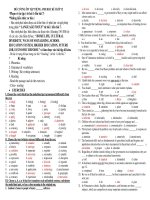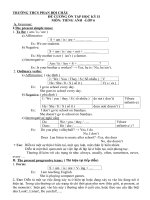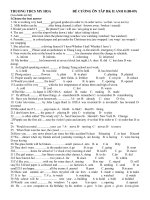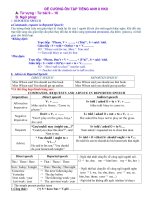Đề cương ôn tập tiếng anh 8 học kì 2 năm học 2018 – 2019 trường THCS Thăng Long
Bạn đang xem bản rút gọn của tài liệu. Xem và tải ngay bản đầy đủ của tài liệu tại đây (684.77 KB, 8 trang )
<span class='text_page_counter'>(1)</span><div class='page_container' data-page=1>
<b>Phịng GD và ĐT Ba Đình </b>
<b>Trường THCS Thăng long </b>
<b>Đề cương ôn tập lớp 8 học kì 2</b>
<b>Mơn : Tiếng Anh 8 </b>
<b>(Năm học 2018-2019) </b>
<b>REVISION FOR THE FINAL EXAMINATION – GRADE 8 </b>
<b>(2018-2019) </b>
<b>I. Vocabulary: </b>
1) Topics:
a) Kinds of pollution, causes, effects and solutions.
b) People and places in English speaking countries.
c) Types of natural disasters, words to describe natural disasters.
d) Communication forms and communication technology
e) Science and technology inventions
2) Word formation: nouns, verbs, adjectives, adverbs
<b>II. Language focus: </b>
<b>1) Grammar: </b>
a) Teseses (active and passive): present (simple, continuous, perfect), past (simple,
continuous, perfect), futures (simple, continuous), be going to.
b) Structures:
Conditional type 1, 2
Reported speech.
Verbs + to-V
Verbs + V-ing
Compound / complex sentences
<b>2) Phonetics: </b>
Stress of words ending in : -ic / -al / -ese / -ee / -logy / -graphy / -ity / -itive
Stress of words starting in: un- and im-
<b>III. Writing tasks: </b>
a) Write about a type of pollution ( causes - effects – solutions).
b) Write to describe the schedule for your visit to an English Speaking country.
c) Write a news report on a Natural Disaster.
d) Write an email using netiquette.
<b>III. Speaking taks: Bài thi nói gồm 2 phần chính: </b>
</div>
<span class='text_page_counter'>(2)</span><div class='page_container' data-page=2>
<i><b>Cụ thể: Học sinh A hỏi để học sinh B trả lời lần lượt 4 câu hỏi. Sau khi hoàn thành lượt một học </b></i>
<i>sinh B hỏi lại học sinh A. Mỗi lượt diễn ra trong TỐI ĐA 1 phút. </i>
<b>Chủ đề 1: English Speaking Countries </b>
1. What English speaking country would you like to
visit?
2. Where is it?
3. What do you like best about that country?
4. What are some tourist attractions of that country?
<b>Chủ đề 2: Communication </b>
1. How do you often communicate with your friends?
2. How much time do you spend using your mobile
phone each day?
3. In what ways are mobile phones better than home
phones?
4. What problems might you have when using mobile
phones?
<b>Phần 2 (0.5 điểm): Miêu tả tranh </b>
Học sinh thi nói theo cá nhân bốc thăm 1 bức tranh để miêu tả trong TỐI ĐA 1
phút.
Học sinh quan sát bức tranh và trả lời theo các câu hỏi gợi ý cho kèm bức tranh
<b>Chủ đề của tranh miêu tả: Pollution - Natural disasters </b>
</div>
<span class='text_page_counter'>(3)</span><div class='page_container' data-page=3>
<b>PRACTICE </b>
<b>I. Choose the word having different stress from the others. </b>
1. A. effective B. natural C. atmosphere D. plentiful
2. A. solution B. increasing C. recommend D. abundant
3. A. develop B. enormous C. improvement D. different
4. A. energy B. volunteer C. dangerous D. countryside
5. A. referee B. kangaroo C. interfere D. convenient
6. A. negative B. pollutant C. aquatic D. disaster
7. A. illustrate B. recognise C. generate D. electric
8. A. dioxide B. permanent C. advantage D.
consumption
9. A. company B. fortunate C. tornado D. netiquette
10. A. exhausted B. volcanic C. protective D. biogas
11. A. exist B. avoid C. support D. notice
12. A. accent B. disease C. spacious D. legend
13. A. official B. conference C. imagine D. koala
14. A. atmosphere B. plentiful C. disappear D. permanent
15. A. evacuate B. communicate C. contaminate D. celebrate
16. A. unaffected B. undrinkable C. uncountable D. unsuitable
17. A. unpopular B. unorganized C. unfortunate D.
unambitious
18. A. imperfect B. immature C. immobile D. immoral
19. A. translator B. director C. editor D. spectator
20. A. consumer B. performer C. shopkeeper D. deliver
21. A. impair B. unhurt C. effect D. insect
22. A. explorer B. accurate C. unhealthy D. mature
23. A. unnatural B. engineering C. impossible D.
environment
24. A. unhelpful B. unlikely C. unforeseen D. unusual
25. A. imprecise B. imperfect C. impartial D. impassive
26. A. unkind B. kindness C. impure D. machine
27. A. imbalance B. unable C. unhealthy D. impolite
28. A. unexplored B. unforeseen C. untidy D. immature
29. A. impossible B. unnatural C. unrelated D. unbearable
30. A. unlimited B. undeveloped C. unsuccessful D. unaffected
<b>III. Choose the best answer to fill in the blank. </b>
1. Heavy rain is expected to continue and flood warnings ________ by the government.
A. have issued B. have been issued C. are issued <b>D. issued </b>
2. Water pollution can ________ dramatic effects on human beings.
A. make B. do C. have D. result
3. All our English teachers are ________ speakers.
A. original B. native C. foreign D. permanent
4. Water pollution is the _________ of bodies of water such as lakes, rivers, oceans and
ground water.
</div>
<span class='text_page_counter'>(4)</span><div class='page_container' data-page=4>
A. technique B. technician C. technology D. technological
6. If you ________ something, you should patent it as quickly as possible.
A. are inventing B. will invent C. have invented D. invented
7. The new invention would have a wide range of ________ in industry.
A. goodness B. concerns C. advance D. applications
8. I wonder what ________ in the year 2020.
A. will I be doing B. am I doing C. I will be doing D. will do
9. I hope you ________ when I arrive home this evening.
A. don’t work B. won’t be
working C. didn’t work D. won’t work
10. The teacher ________ me that I had better devote more time to science subjects such as
physics, chemistry, and biology.
A. talked B. told C. spoke D. said
11. If the teacher were here now, we’d ask him the difference ________ ʻscienceʼ and
ʻtechnologyʼ.
A. between B. of C. for D. among
12. By the time we got to the cinema, the film ________ so we missed its beginning.
A. started B. had started C. was starting D. was started
13. The tremendous storm made hundreds of people _______.
A. died B. death C. dead D. to die
14. Eating too much sugar can ________ to health problems.
A. cause B. lead C. make D. result
15. Thousands of people became homeless ________ the tremendous storm.
A. because of B. due to C. thanks to D. A and B
16. What _______ you do if you _______ a million dollars?
A. do / win B. will / win C. did / won D. would / won
17. ________ your laptop this evening? May I borrow it to do my project homework?
A. Will you be
using
B. Do you use C. Are you using D. Will you use
18. If you ________ the president, what ________ you do to help the environment?
A. are / do B. were / would C. were / will D. are / did
19. Which TV programme ________ at 9 p.m yesterday?
A. will you be
watching
B. did you watch C. were you
watching
D. had you watched
20. The heavy rain has caused ________ in many parts of the country.
A. floods B. droughts C. storms D. tornadoes
21. The process of moving people from a place of danger to a safer place is called ______.
A. emergency B. evacuation C. operation D. movement
22. Artificial Intelligence (AI) is an area of ________ concerned with making computers
copy intelligent human behaviour.
A. invention B. learning C. lesson D. study
23. The protection of technologies and technological information has become ________ for
many nations.
</div>
<span class='text_page_counter'>(5)</span><div class='page_container' data-page=5>
24. Astronauts use ________ to move around when they are on the Moon’s surface.
A. moon buggies B. space cars C. spaceships D. flying saucers
25. Workers are now ________ up the debris left behind by the severe storm.
A. cleaning B. moving C. clearing D. collecting
<b>IV. Use the correct forms of the words in brackets. </b>
1. There is still room for your (improve) ………in your work.
2. Today scientific progress is mostly defined in terms of
(technology)………advancements.
3. The first experience was (succeed)………, so we need to do another one.
4. A (geology) …………is a scientist who studies the solid and liquid matter that constitutes the
Earth.
5. The US (explore) ………of the Moon began with the Ranger 4 impactor in
1962.
6. A nuclear power reactor (operate) ………could provide assistance with the loading
and unloading of nuclear fuel.
7. The study point out that many people’s health has been affected from bathing or drinking
(pure) ………water.
8. Thousands of (chemistry) ………are used in everyday products –in our water, our
food and in the air we breathe.
9. (Research)………in Japan have found that human ageing may be able to be
delayed or even reserved.
10. Here are several (science) ………proven studies that describe how to keep fit.
<b>V. Use the correct form of the words in brackets to complete the passage. </b>
Professor Vo Hong Anh – the only daughter of General Vo Nguyen Giap and Nguyen Thi
Quang Thai – was a famous Vietnamese (1. science) ………. Vo Hong Anh was born in
1939. She graduated from Lomonosov University, Russia, in 1965. On returning to Viet Nam,
she worked as a (2. research) ………. at the National Institute of Science. In 1982 she
(3. success) ………. completed her doctor’s degree in maths and physics, and in 1983 she
was appointed professor. She continued to do research in the fields of maths and physics. Over
the 40 years of her study and research, she had more than 50 (4. science) ………. works
published (mostly overseas). In 1988 she was the first Vietnamese woman to be awarded the
Kovalevskaia Prize for her (5. contribute) ……..……. to science. She died in 2009 in Ha Noi.
She was the pride of Vietnamese women.
<b>VI. Read the passage and choose the correct answer A, B, C or D. </b>
Environmental pollution is a term that (1)______ to all the ways by which man pollutes his
surroundings. Man dirties the air with (2)______ gases and smoke, (3)_____ the water with
chemicals and other substances, and damages the (4)_____ with too many fertilizers and
pesticides. Man also pollutes his surroundings (5)_____ various other ways. For example, people
ruin natural beauty by (6)_____ junk and litter on the land and in the water.
Environmental pollution is one of the most serious problems facing mankind today. Air,
water and soil are necessary to the (7)_____ of all living things. Badly polluted air can cause
illness, and (8)_____ death. Polluted water kills fish and other (9)_____ life. Pollution of soil
reduces the amount of land that is available for growing food. Environmental pollution also
brings ugliness to man’s (10) _____ beautiful world.
</div>
<span class='text_page_counter'>(6)</span><div class='page_container' data-page=6>
3. A. purifies B. pumps C. sprays D. poisons
4. A. soil B. forests C. streets D. beaches
5. A. on B. in C. by D. with
6. A. spoiling B. leaving C. scattering D. gathering
7. A. survival B. environment C. development D. growth
8. A. so B. ever C. too D. even
9. A. animal B. marine C. human D. plant
<b>10. A. nature B. natural C. naturally D. natured </b>
<b>VII. Read the passage and choose the correct answer. Circle A, B, or C. </b>
Ha Tinh is a <b>disaster-prone</b> province in the central of Viet Nam. Since the beginning of 2015, this
province has experienced three massive floods, causing devastating property damage. The floods
razed thousands of homes, damaged numerous irrigation works, roads, schools and healthcare
centres. Ms. Nga Tran, a local resident, recalled the last flood, “The flood in June was normal, but
the one in September was awful. Water from Ngan Pho River began to submerge the floor, while
outside it was still raining heavily. After a while the water was about one meter. I had no choice but to
climb up to the attic and stay there for two days.” Like many other residents, all of Ms Nga’s furniture
was covered in mud, some was completely damaged for having been soaked in the water for too
long. But what worried her most was the loss of her rice crop. Three months after the flood, lots of
farmers still struggled with finding enough food to eat. If there is no aid from the government, the
situation in this province will get worse.
1. What does <b>disaster-prone</b> mean?
A. having no disasters B. likely to have disasters C. have very few disasters
2. What is NOT mentioned as consequences from the floods?
A. loss of life B. loss of property C. loss of crop
3. When was the flood as recalled by Ms. Nga Tran?
A. January B. June C. September
4. How long did Ms. Nga Tran stay in her attic?
A. for the whole week B. two days C. three months
5. What is the biggest worry of Ms. Nga and other residents?
A. lack of food B. lack of accommodation C. lack of aid
<b>VIII. Read the text about Alexander Graham Bell and do the tasks </b>
<b> Alexander Graham Bell is widely known as inventor of the first telephone. He was born on </b>
March 3rd<sub>, 1847 in Edinburgh, Scotland. When he was 23, Bell emigrated to Canada with his </sub>
parents and the next year moved to the United States to teach deaf-mute children. With his
colleague Thomas Watson , Bell worked very hard on the experimentation to invent devices such
<i>as the harmonic telegraph ( used to send multiple messages over a single wire) and phonograph </i>
( used to draw the shape of the sound waves. The first telephone communication was said to have
happened between Bell and Watson in 1876 while Bell was at one end of the line, and Watson
worked on the telephone in other room. The first transmitted words were, ‘ Mr. Watson, come here
. I want to see you’
<b>a. Decide if the statements are T or F </b>
1. Alexander Graham Bell is Scottish.
2. He spent all his life in Canada
3. He worked with the deaf when he moved to the USA
4. He wanted to create a device that can transmit human voice
5. He was able to succeed right from the first experiment
6. He worked on his inventions all by himself
</div>
<span class='text_page_counter'>(7)</span><div class='page_container' data-page=7>
1.What is Bell ‘s ‘harmonic telegraph’ ?
2.What is Bell ‘s ‘phonograph’
3.When did the first communication over happened and how did it happen?
<b>IX. Combine the sentences into a new sentence that shows a cause/effect relationship. Use </b>
<b>the words in brackets. </b>
1.Many rivers and lakes are poisoned. Factories produce waste and pour it into rivers and lakes.
(because)
___________________________________________________________________
2. The environment is polluted. Birds leave their habitats and plants die. (make)
___________________________________________________________________
3. Plastic bags are a major source of waste. We should not throw plastic bags everywhere. (so).
___________________________________________________________________
4. The food is contaminated. People’s health is poor. (results in)
___________________________________________________________________
5. Factories release fumes. The air gets polluted. (due to)
___________________________________________________________________
<b>X. Combine each pair of sentences to make a conditional sentence type 1. </b>
1. Students are more aware of protecting the environment. Teachers teach environmental issues
at school.
___________________________________________________________________
2. Light pollution happens. Animals change their behaviour patterns.
___________________________________________________________________
3. The levels of radioactive pollution decrease. We switch from nuclear power to renewable
energy sources.
___________________________________________________________________
4. The water temperature increases. Some aquatic creatures are unable to reproduces.
___________________________________________________________________
5. People get more diseases. The water is contaminated.
___________________________________________________________________
<b>XI. Combine each pair of sentences to form a conditional sentence, using “if” Type 2. </b>
1. The factory is located near our village. There is air pollution and noise pollution.
___________________________________________________________________
2. The local people have to use water from the polluted river. They don’t have fresh water.
___________________________________________________________________
3. Trees and grasses cannot grow here. The soil is badly polluted.
___________________________________________________________________
4. Mr Quang works in a noisy environment. His hearing becomes worse.
___________________________________________________________________
<b>XII. Change these statements into reported speech. </b>
1. “I want my room to look nice at the festival” Hoa
said.__________________________________________________
2. “I’m cleaning our house.” Loan said to Lan
__________________________________________________
3. “I will clean all the class windows tomorrow” said
</div>
<span class='text_page_counter'>(8)</span><div class='page_container' data-page=8>
4. “I’m having a good time here” said Lan.
__________________________________________________
5. “We can play the guitar.” Mary said.
__________________________________________________
6. “We are going to the rice- cooking contest” said Mr
Robinson._____________________________________________
7. “This room is cleaned every day by my sister.” said the
boy._______________________________________________
8. “I have something to show you now” Quang said to
her.__________________________________________________
9. “I’m leaving here for HN tomorrow” he said.
__________________________________________________
10. “I’ll come with you as soon as I am ready” Lan
said__________________________________________________
<i><b>XIII - Change these sentences into passive form: </b></i>
1. How often do you tidy your room?
2. Somebody has told him about the change in the schedule.
3. A terrible storm struck the province of Nghe An last night.
4. The government will sent food supplies to the affected areas.
5. Which mean of transport will we use mainly in the future?
6. We should help the victims of the flood.
7. They rescued hundreds of people from the collapsed buildings.
8. They are going to rebuild damaged schools in this area soon.
9. He is showing us how to recycle plastic bottles.
10. They had given the victim first-aid when the ambulance arrived.
</div>
<!--links-->









